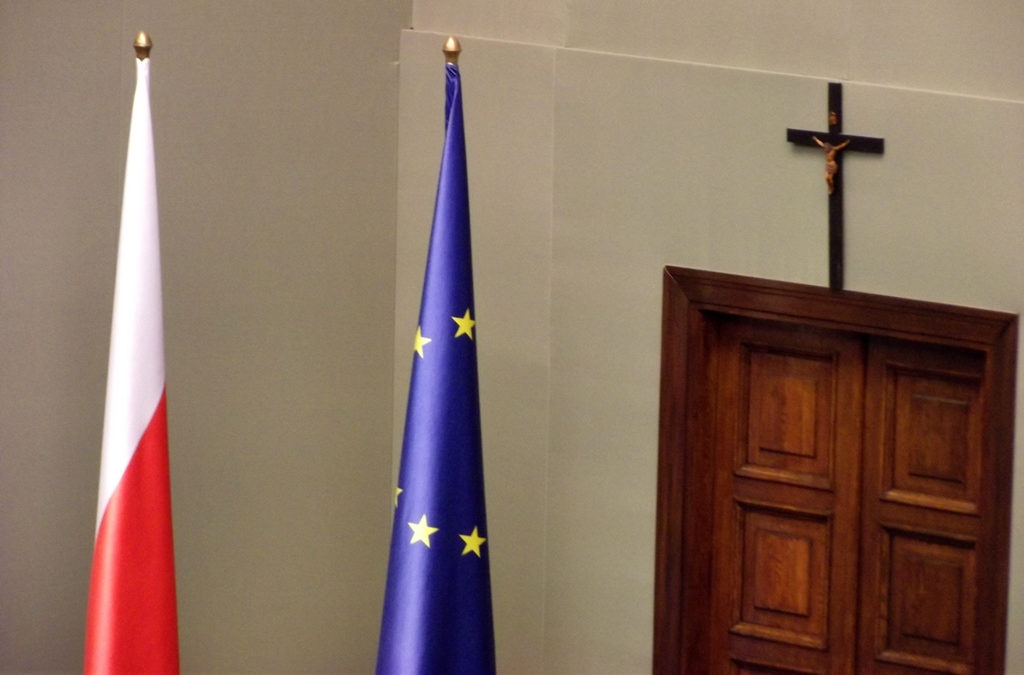Poland’s Catholic episcopate has issued an appeal to the government and opposition to come to a compromise over presidential elections that are due to take place next week but remain mired in confusion and controversy.
Meanwhile, Donald Tusk, the former Polish prime minister and head of the European Council, has issued a statement declaring that he will boycott next week’s “voting procedure”, which he says “bears no relation to an election”. He has called on his fellow Poles to do likewise.
The first round of the election is scheduled for 10 May, next Sunday. The government has begun preparations for an all-postal vote, something that opponents point out is unlawful given that the relevant legislation has not yet been passed. With negotiations between various parties and factions continuing, there remain doubts over how and when the elections will take place.
Poland’s postal election enveloped in confusion as government pushes ahead before legislation passed
Bishops: “election should not raise legal doubts”
The country’s bishops, who remain influential in a country where around 90% of the population identify as Catholic, have now stepped into the fray, issuing a statement from the Polish Episcopal Conference (KEP), the central organ of the Catholic church in Poland.
They “appeal to the conscience of people responsible for the common good of the homeland, both those in power and the opposition to work out a common position on the presidential elections during this extraordinary situation”.
The bishops note that the church cannot take a position in a political dispute, but they call on the various parties to “seek solutions…that would not raise legal doubts and suspicion of not only violation of the constitutional order, but also of the principles of free and fair elections in a democratic society”.
“In this difficult situation, we should take care of the cultivation of democracy, defence of the rule of law and of building – despite differences – a culture of solidarity, including in the political sphere”, as well of protecting “the lives and health of Poles”, says the episcopate.
Należy podkreślić, że dzisiejszy apel o wypracowanie wspólnego stanowiska dotyczącego wyborów prezydenckich ma na celu dobro wspólne Polaków, a nie wspieranie jakiejkolwiek ze stron sporu politycznego.
Całość:https://t.co/XTD6ZeFo6m pic.twitter.com/Jal0UIZUSA
— EpiskopatNews (@EpiskopatNews) April 28, 2020
The ruling party’s hasty arrangements for an all-postal vote have raised a number of legal doubts. The Constitutional Tribunal has previously ruled that significant changes to the electoral code cannot be made less than six months before an election. Yet the law introducing postal voting is set to be passed just days before the vote next week.
In addition, many local authorities have refused to cooperate in organising the election because they point out that the government is making arrangements for a postal vote before the relevant legislation has been passed.
In response, the deputy prime minister, Jacek Sasin, has said that the government is operating under “the assumption that it will be in force”, and that it has a constitutional obligation to organise the vote by the agreed deadline.
Yet the opposition’s own proposal to delay the election by a year would require an official state of natural disaster to be declared and then renewed every month to fit the electoral timetable. It would also mean the elections would be held well after the end of the current president, Andrzej Duda’s, term.
Tusk: “if we are united, I am almost certain that PiS will step back”
Meanwhile, this morning Donald Tusk, chairman of the European People’s Party, published a statement declaring that he would boycott the elections. In fact, he explicitly refused to recognise them as elections at all, “because they will not be free or equal” and are “unconstitutional” due to the last-minute changes to the electoral code.
Oświadczenie w sprawie „wyborów” 10 maja.https://t.co/Gd3N7Oizwo
— Donald Tusk (@donaldtusk) April 28, 2020
He also expressed doubt that they could be organised quickly enough while safeguarding public health, as well as concern that voting would not be secret because voters must send personal information along with (but in a separate part of the envelope to) their ballot.
Tusk appealed to Poles to follow his lead, saying that “if we are united, I am almost certain that PiS will step back and together with other political forces agree to a plan that will be safe and…fair”.
Legal scholars: “a gross violation of the constitution”
Separately, a group of 425 legal scholars from universities across Poland today published a joint letter urging next week’s vote not to go ahead. The current arrangements “violate in a gross and fundamental manner the principles of conducting elections, which stem from Poland’s constitution and international obligations”, they wrote.
Like Tusk, they expressed concern over the secrecy of voting, as well as whether it would be universal, because some voters – including those currently living at a different address or residing abroad – may not receive their ballot papers by post. They also warned that there will not be transparency in the counting of votes.
“We have no doubt that postponing the date is possible without violating the Polish constitution,” concluded the scholars, quoted by RMF24.
Their statement adds to a chorus of other organisations that have criticised the manner in which next week’s elections are being organised. These include the Supreme Court, the Association of Polish Cities and the Commissioner for Human Rights, as well as international bodies including the European Commission and Parliament, the OSCE and Amnesty International.
Main image credit: Piotr Drabik/Flickr (under CC BY 2.0)

Daniel Tilles is editor-in-chief of Notes from Poland. He has written on Polish affairs for a wide range of publications, including Foreign Policy, POLITICO Europe, EUobserver and Dziennik Gazeta Prawna.




















